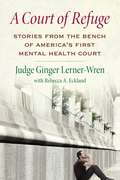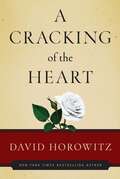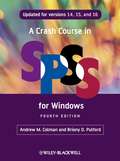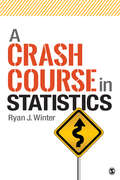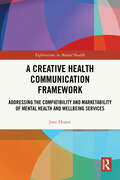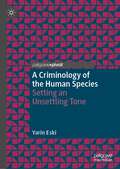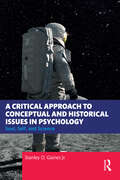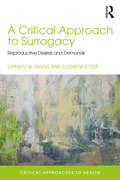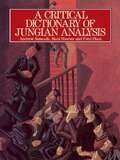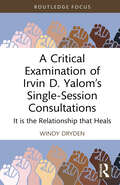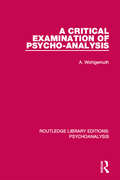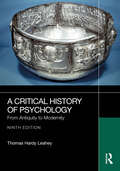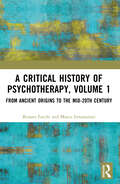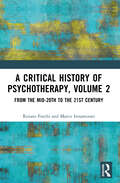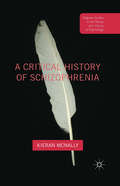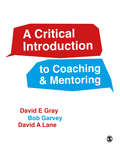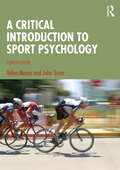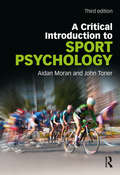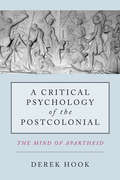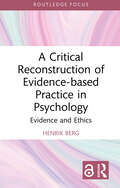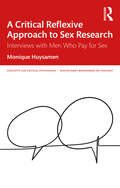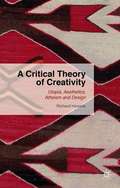- Table View
- List View
A Court of Refuge: Stories from the Bench of America's First Mental Health Court
by Ginger Lerner-Wren Rebecca A. EcklandThe story of America's first Mental Health Court as told by its presiding judge, Judge Ginger Lerner-Wren--from its inception in 1997 to its implementation in over 400 courts across the nationAs a young legal advocate, Ginger Lerner-Wren bore witness to the consequences of an underdeveloped mental health care infrastructure. Unable to do more than offer guidance, she watched families being torn apart as client after client was ensnared in the criminal system for crimes committed as a result of addiction, homelessness, and mental illness. She soon learned this was a far-reaching crisis--estimates show that in forty-four states, jails and prisons house ten times more people with serious mental illnesses than state psychiatric hospitals. In A Court of Refuge, Judge Ginger Lerner-Wren tells the story of how the first dedicated mental health court in the United States grew from an offshoot of her criminal division, held during lunch hour without the aid of any federal funding, to a revolutionary institution. Of the two hundred thousand people behind bars at the court's inception in 1997, more than one in ten were known to have schizophrenia, bipolar disorder, or major depression. To date, the court has successfully diverted more than twenty thousand people suffering from various psychiatric conditions from jail and into treatment facilities and other community resources. Working under the theoretical framework of therapeutic jurisprudence, Judge Lerner-Wren and her growing network of fierce, determined advocates, families, and supporters sparked a national movement to conceptualize courts as a place of healing. Today, there are hundreds of such courts in the US.Poignant and compassionately written, A Court of Refuge demonstrates both the potential relief mental health courts can provide to underserved communities and their limitations in a system in dire need of vast overhauls of the policies that got us here. Lerner-Wren presents a refreshing possibility for a future in which criminal justice and mental health care can work in tandem to address this vexing human rights issue--and to change our attitudes about mental illness as a whole.
A Cracking of the Heart
by David HorowitzAfter losing a loved one, "pay attention to the ways in which your relationship continues."So advised Sarah Horowitz in an interview she gave the day before her unexpected death. In A Cracking of the Heart, David Horowitz explores the legacy of his extraordinary daughter's short life, and narrates his quest for a deeper understanding of the child he lost.A remarkable woman and gifted writer, Sarah was afflicted with a birth condition that, while complicating and ultimately shortening her life, never affected her dreams. From an early age, she displayed inspiring courage in facing her own difficulties and boundless compassion for the underserved and overlooked in many communities, from an autistic niece in her own family to uneducated children in Africa.A Cracking of the Heart chronicles the separation of father and daughter through political and familial conflicts, and their slow reunion. Alternately searing and uplifting, it reconciles what could have been with what is, taking the reader through a father's love, frustration, admiration, and grief, to what lies beyond.
A Crash Course in SPSS for Windows
by Briony D. Pulford Andrew M. ColmanThis quick, simple, and user-friendly introduction to SPSS for Windows has now been updated so that it can be used with Versions 14 to 16 of the software. For this edition, a section has been added on partial correlation, together with new material on sorting, classifying, and coding data, inserting variables and cases, and paneling charts and graphs, and the chapter on charts and graphs has been completely rewritten in line with changes to the SPSS Chart Builder. The supporting website allows data sets used in the book to be downloaded from the Internet and provides additional examples from various social science disciplines.The fourth edition retains all of the features that have made the text so attractive to students and teachers:The material is concise and focused, enabling most users to learn the basics comfortably within 10 hours.All the most widely used statistical techniques and graphic facilities in SPSS for Windows are clearly described.Every statistical procedure is explained with the help of a step-by-step analysis of a numerical example taken from real data in published research.The authors have chosen small data sets so that readers do not waste unnecessary time inputting data.Screenshots on the page make it easy for students to cross between the text and the screen.Online support material to accompany the text is available at www.blackwellpublishing.com/crashcourse/
A Crash Course in Statistics
by Ryan J. WinterA Crash Course in Statistics is a short introduction to key statistical methods including descriptive statistics, one-way and two-way ANOVA, the t-test, and Chi Square. Each of the five chapters provides an overview of each method, and then walks readers through a relevant example, using SPSS to highlight how to run the statistics and how to write up the results in APA style. Each chapter ends with a self-quiz so that readers can assess their understanding of each statistical concept. This "crash course" supplement is a must-have statistics refresher for students taking research methods classes; a handy additional reference for introductory statistics students; and a guide for anyone who needs to be a consumer of statistics.
A Crash Course in Statistics
by Ryan J. WinterA Crash Course in Statistics is a short introduction to key statistical methods including descriptive statistics, one-way and two-way ANOVA, the t-test, and Chi Square. Each of the five chapters provides an overview of each method, and then walks readers through a relevant example, using SPSS to highlight how to run the statistics and how to write up the results in APA style. Each chapter ends with a self-quiz so that readers can assess their understanding of each statistical concept. This "crash course" supplement is a must-have statistics refresher for students taking research methods classes; a handy additional reference for introductory statistics students; and a guide for anyone who needs to be a consumer of statistics.
A Creative Health Communication Framework: Addressing the Compatibility and Marketability of Mental Health and Wellbeing Services (Explorations in Mental Health)
by Jane HearstThis groundbreaking volume offers a theoretical, practical, and evidence-based approach to bridging the gap between service-users, -providers, and -commissioners in order to establish Creative Health as a valued part of healthcare, and a key player in the broader healthcare marketplace.Offering actionable strategies to strengthen interdisciplinary networks and enrich the Creative Health landscape within modern healthcare systems, the book provides a comprehensive analysis of how economic systems, healthcare philosophy, and societal perceptions shape the uptake and effectiveness of Creative Health services. It outlines the systemic barriers to widespread recognition and identifies how targeted communication can engage both service-users and market forces. Through pragmatic solutions and narrative-based research, chapters present the concept of 'market wellbeing' — a negotiation space that aligns the needs of individuals with healthcare market objectives, fostering stronger connections and sustainability for Creative Health. Ultimately, an entirely novel Creative Health Communication Framework is outlined in the third part of the volume, designed to empower readers with the insights and strategies that can reshape how Creative Health is communicated and valued.This will be a key volume for scholars, researchers, and postgraduate students in Creative Health, creative arts and expressive therapies, and mental health and health psychology more broadly. Creative Health practitioners should also find this volume of use.
A Criminology of the Human Species: Setting an Unsettling Tone (Palgrave Studies in Green Criminology)
by Yarin EskiThe book sketches out how the criminological lens could be used in the climate change debate around possible human extinction. It explores the extent to which the human species can be considered deviant in relation to other species of the contemporary biosphere, as humans seem to be the only species on Earth that does not live in natural balance with their environment (anymore). It discusses several unsettling topics in the public debate on climate change, specifically the taboo of how humans may not survive the ongoing climate change. It includes chapters on the Earth’s history of mass-extinctions, the global state of denial including toward the possibility that the human species could go extinct, and it considers humans' future as a deviant, fatal species outside of Earth, in outer-space, possibly on other planets. It puts forward and enriches the critical criminological tradition by conceptualizing and setting an unsettling tone within criminology and criminological research on the human species and our extinction, by daring criminologists (and victimologists) to ponder and seek empirical answers to controversial imaginations and questions about our possible extinction.
A Critical Approach to Conceptual and Historical Issues in Psychology: Soul, Self, and Science
by Stanley O. Gaines, Jr.A Critical Approach to Conceptual and Historical Issues in Psychology: Soul, Self, and Science examines the evolving concept of human consciousness throughout the ages to show how humanity progressed from ‘studies of the soul’ – a major concern of ancient philosophy – to a science of the mind including the self – a primary concern of contemporary psychology.Divided into five parts, the book moves through the history of psychology from its philosophical roots into the present day and beyond. It takes a balanced and critical approach to figures and theories which have been instrumental in the development of psychology as a discipline, such as Plato, Descartes, Wundt, Du Bois, Freud, Jung, Watson, Skinner, and Maslow. Throughout, it offers diverse perspectives on the field’s history, providing insights into such topics as race and intelligence, gender and personality, and their treatment within psychology. Each chapter is supported by breakout boxes highlighting key theories related to that chapter’s topic. Thought questions, to encourage the reader to critically evaluate what they have read, notes with further information, and suggestions for further reading are provided online.Of particular interest to postgraduate students on MSc conversion courses, the book will also interest undergraduate students completing history of psychology, conceptual and historical issues in psychology, history and systems of psychology, and related modules. This textbook was designed to comply with the QAA Subject Benchmark Statement in Psychology and the BPS accreditation guidelines for content in Conceptual and Historical Issues in Psychology
A Critical Approach to Surrogacy: Reproductive Desires and Demands (Critical Approaches to Health)
by Damien W Riggs Clemence DueThis comprehensive text makes an important contribution to the study of surrogacy, developing a novel theoretical framework through which to understand the broader social contexts as well as individual decisions at play within surrogacy arrangements. Drawing on empirical research conducted by the authors and supplemented by secondary analyses of media, legislative and public accounts of surrogacy, the book engages with the key stakeholders involved in the practice of surrogacy. Specifically, it canvases the standpoints of women who act as surrogates, intending parents who commission surrogacy arrangements, children born through surrogacy, clinics that facilitate the arrangements, and politicians and journalists who engage with the topic. Through a focus on capitalism as a means of orientating ourselves to the topic of surrogacy, the book highlights the vulnerabilities that potentially arise in the context of surrogacy, as well as the claims to agency invoked by some parties in order to mitigate vulnerability. In so doing, the book demonstrates that the psychology of surrogacy must be broadly understood as an orientation to particular ways of thinking about children, reproduction and economies of labour.
A Critical Dictionary of Jungian Analysis
by Andrew Samuels Bani Shorter Fred PlautThe language of Jung's writings, and of analytical psychology generally, is sometimes difficult to understand. This guide, in dictionary format, combines scholarship and historical accuracy with a stimulating, critical attitude.
A Critical Examination of Irvin D. Yalom’s Single-Session Consultations: It is the Relationship that Heals (Routledge Focus on Mental Health)
by Windy DrydenThis book explores the single-session work done by Irving Yalom and considers the implications of this work for the current theory and practice of single-session therapy (SST).Due to failing memory and decreasing stamina as he aged, Yalom eventually decided that if he was to continue to offer help to patients, he could only do so by offering them single-session consultations. While it was perhaps reluctant single-session work, it coincided with the continued rise of SST starting with the publication of Moshe Talmon's book in 1990. This book examines Yalom’s work against the growing literature on single-session therapy, covering both what single-session therapists can learn from Yalom’s consultations as well as what they would not want to implement. Dryden closely examines Yalom’s work in these sessions through a single-session mindset and tracks how it impacts the development of SST.This book will be of interest to any single-session practitioners as well as those scholars and followers of Yalom.
A Critical Examination of Psycho-Analysis (Routledge Library Editions: Psychoanalysis)
by A. WohlgemuthOriginally published in 1923, this title is a critical examination of Freud’s theory of psychoanalysis. A contemporary of Freud, the author sets out to evaluate his theories in a scientific manner, searching for evidence. The result is a rather scathing review of where this is lacking.
A Critical History and Philosophy of Psychology
by Richard T. G. Walsh Thomas Teo Angelina Baydala Richard T. G. Walsh Thomas TeoIn line with the British Psychological Society's recent recommendations for teaching the history of psychology, this comprehensive undergraduate textbook emphasizes the philosophical, cultural and social elements that influenced psychology's development. The authors demonstrate that psychology is both a human (i. e. psychoanalytic or phenomenological) and natural (i. e. cognitive) science, exploring broad social-historical and philosophical themes such as the role of diverse cultures and women in psychology, and the complex relationship between objectivity and subjectivity in the development of psychological knowledge. The result is a fresh and balanced perspective on what has traditionally been viewed as the collected achievements of a few 'great men'. With a variety of learning features, including case studies, study questions, thought experiments and a glossary, this new textbook encourages students to critically engage with chapter material and analyze themes and topics within a social, historical and philosophical framework.
A Critical History of Psychology: From Antiquity to Modernity
by Thomas Hardy LeaheyThis fully updated and refreshed 9th edition places social, economic and political forces of change alongside psychology’s internal theoretical and empirical arguments. It utilizes a critical lens to illuminate the way in which the external world has shaped the development of psychology and, in turn, how psychology from antiquity to modernity has shaped society.The text approaches the material from an integrative, rather than wholly linear, perspective, carefully examining how issues in psychology reflect and affect concepts that lie outside the field of psychology’s technical concerns as a science and profession.Key features of this edition include: A newly reconsidered structure, including five additional interludes exploring historical background narratives and the rise of modernity, to allow for flexible and adaptable textbook use. Expanded exploration of the two psychologies: the Way of Ideas, driven by epistemology and unique to Europe, and The Way of Human Nature, a universal concern to find a science of human behavior and its management. Including scientific, applied, and professional psychology, as well as coverage of the social sciences and social policy implications, this book is appropriate for high-level undergraduate and graduate students.
A Critical History of Psychotherapy, Volume 1: From Ancient Origins to the Mid 20th Century
by Renato Foschi Marco InnamoratiThis unique book offers a comprehensive overview of the history of psychotherapy. The first of two volumes, it traces the roots of psychotherapy in ancient times, through the influence of Freud and Jung up to the events following World War II. The book shows how the history of psychotherapy has evolved over time through different branches and examines the offshoots as they develop. Each part of the book represents a significant period of time or a decade of the 20th century and provides a detailed overview of all significant movements within the history of psychology. The book also shows connections with history and contextualizes each therapeutic paradigm so it can be better understood in a broader social context. The book is the first of its kind to show the parallel evolution of different theories in psychotherapy. It will be essential reading for researchers and students in the fields of clinical psychology, psychotherapy, psychiatry, the history of medicine and psychology.
A Critical History of Psychotherapy, Volume 2: From the Mid-20th to the 21st Century
by Renato Foschi Marco InnamoratiThis unique book offers a comprehensive overview of the history of psychotherapy. Volume 2 traces the evolution of psychotherapy from the 1950s and the later 20th century through to modern times, considering what the future of psychotherapy will look like. The book shows how the history of psychotherapy has evolved over time through different branches and examines the offshoots as they develop. Each part of the book represents a significant period of time or a decade of the 20th century and provides a detailed overview of all significant movements within the history of psychology. The book also shows connections with history and contextualizes each therapeutic paradigm so it can be better understood it in a broader social context. The book is the first of its kind to show the parallel evolution of different theories in psychotherapy. It will be essential reading for researchers and students in the fields of clinical psychology, psychotherapy, psychiatry, the history of medicine and psychology.
A Critical History of Schizophrenia (Palgrave Studies in the Theory and History of Psychology)
by Kieran McNallySchizophrenia was 20th century psychiatry's arch concept of madness. Yet for most of that century it was both problematic and contentious. This history explores schizophrenia's historic instability via themes such as symptoms, definition, classification and anti-psychiatry. In doing so, it opens up new ways of understanding 20th century madness.
A Critical Introduction to Coaching and Mentoring: Debates, Dialogues and Discourses
by David A Lane Professor Robert Garvey David E GrayThis is the definitive introduction to coaching and mentoring, written by an experienced and multidisciplinary team. Taking you all the way through from the emerging theory to informed practice, the book covers: · Skills, purposes and outcomes of coaching and mentoring processes · The many settings in which they take place – public, private and voluntary · Coaching and mentoring’s evidence base and how it is assessed · The professionalization of coaching and mentoring and a move towards integration. Supported by a wide range of case studies, activities, further questions and topics for discussion, this book is a comprehensive but accessible introduction. The authors take a critical approach and go beyond the basics, to support your development as a critically reflective practitioner. It is essential reading for those studying coaching and mentoring, and professionals looking to integrate coaching and mentoring into their organizations.
A Critical Introduction to Coaching and Mentoring: Debates, Dialogues and Discourses
by David A Lane David E Gray Robert GarveyThis is the definitive introduction to coaching and mentoring, written by an experienced and multidisciplinary team. Taking you all the way through from the emerging theory to informed practice, the book covers: · Skills, purposes and outcomes of coaching and mentoring processes · The many settings in which they take place – public, private and voluntary · Coaching and mentoring’s evidence base and how it is assessed · The professionalization of coaching and mentoring and a move towards integration. Supported by a wide range of case studies, activities, further questions and topics for discussion, this book is a comprehensive but accessible introduction. The authors take a critical approach and go beyond the basics, to support your development as a critically reflective practitioner. It is essential reading for those studying coaching and mentoring, and professionals looking to integrate coaching and mentoring into their organizations.
A Critical Introduction to Sport Psychology
by Aidan Moran John TonerThis new fourth edition remains the only textbook in the field which provides a detailed overview of key theories, concepts and findings within the discipline of sport psychology, as well as a critical perspective that examines and challenges these core foundations.Fully revised and updated, the new edition covers topics affecting both participation and performance in sport, including motivation, anxiety, emotional coping, concentration, mental imagery, expertise, and team cohesion. In addition, the book includes a range of helpful features that bring the science to life, including critical thinking exercises, suggestions for student projects, boxes highlighting key advances in theory or practice, and end-of-chapter summaries. The final chapter examines some new horizons in sport psychology, including embodied cognition, and a comprehensive glossary is also included.Sport is played with the body but often won in the mind; that is the theory. A Critical Introduction to Sport Psychology is the definitive textbook for anyone wishing to engage critically with this fascinating idea.
A Critical Introduction to Sport Psychology: A Critical Introduction
by Aidan Moran John TonerThe new third edition of A Critical Introduction to Sport Psychology is the only textbook in the field that provides a detailed overview of key theories, concepts and findings within the discipline of sport psychology, as well as a critical perspective that examines and challenges these core foundations. Fully revised and updated, the new edition covers key research findings affecting both participation and performance in sport, including topics such as motivation, anxiety, emotional coping, concentration, mental imagery, expertise and team cohesion. In addition, the book includes a range of helpful features that bring the science to life, including critical thinking exercises, suggestions for student projects and new "In the spotlight" boxes that highlight key advances in theory or practice. A comprehensive glossary is also included, whilst a final chapter examines some new horizons in sport psychology, including embodied cognition and socio-cultural perspectives. Sport is played with the body but often won in the mind; that is the theory. A Critical Introduction to Sport Psychology is the definitive textbook for anyone wishing to engage critically with this fascinating idea.
A Critical Psychology of the Postcolonial: The Mind of Apartheid
by Derek HookAn oft-neglected element of postcolonial thought is the explicitly psychological dimension of many of its foundational texts. This unprecedented volume explores the relation between these two disciplines by treating the work of a variety of anti-colonial authors as serious psychological contributions to the theorization of racism and oppression. This approach demonstrates the pertinence of postcolonial thought for critical social psychology and opens up novel perspectives on a variety of key topics in social psychology. These include: the psychology of embodiment and racialization resistance strategies to oppression 'extra-discursive’ facets of racism the unconscious dimension of stereotypes the intersection of psychological and symbolic modalities of power. In addition, the book makes a distinctive contribution to the field of postcolonial studies by virtue of its eclectic combination of authors drawn from anti-apartheid, psychoanalytic and critical social theory traditions, including Homi Bhabha, Steve Biko, J.M. Coetzee, Frantz Fanon, Julia Kristeva, Chabani Manganyi and Slavoj Żiżek. The South African focus serves to emphasize the ongoing historical importance of the anti-apartheid struggle for today’s globalized world. A Critical Psychology of the Postcolonial is an invaluable text for social psychology and sociology students enrolled in courses on racism or cultural studies. It will also appeal to postgraduates, academics and anyone interested in psychoanalysis in relation to societal and political issues.
A Critical Reconstruction of Evidence-based Practice in Psychology: Evidence and Ethics (Routledge Focus on Mental Health)
by Henrik BergEvidence-based practice in psychology is the dominant regulatory principle in clinical psychology, defining psychological knowledge and its application. This book provides a critical analysis and a reconstruction of the policy statement focusing on epistemology and ethics.The book shows the ideological and historical background for the development of evidence-based practice in psychology. It covers the main conceptual and empirical arguments leading to this transition including philosophy and evidence-based medicine. The book goes on to show some of the defects of evidence-based practice in psychology: it misconstrues psychological knowledge; reduces the number of ethical resources available to regulate psychological practices; does not fulfil its ambitions of being a tripartite concept; and undertheorises the issue of integration. The closing chapters provide a constructive critique, preserving the valuable aspects of evidence-based practice in psychology while developing it to make it function adequately. In that sense, the book aims to change the way psychological knowledge is understood and used in practice.This text will be engaging and thought-provoking for anyone using psychological knowledge with patients or clients. It will provide analytic resources to understand psychology better and facilitate the application of psychological knowledge in various settings.
A Critical Reflexive Approach to Sex Research: Interviews with Men Who Pay for Sex (Concepts for Critical Psychology)
by Monique HuysamenA Critical Reflexive Approach to Sex Research is a methodologically focused book that offers rich insights into the, often secret, subjectivities of men who pay for sex in South Africa. The book centres on the interview context, outlining a critical reflexive approach to understanding how knowledge is co-produced by both the interviewer and the participant in research about sex. By attending to the complex dynamics of the research interview, this book examines the historic and contemporary relationship between sex work, race, coloniality, sexuality, masculinity, femininity, whorephobia, and discourses of disease and contagion. It draws on both empirical interview data and Huysamen’s entries in her research journal to offer a unique approach to building critical reflexivity into every phase of the research process. The critical reflexive approach uses an assemblage of poststructuralist and psychoanalytic theories and practices which together provide tools to interrogate how interview dynamics facilitate, shape, and restrain the meaning that is produced within the interview. This book will be a valuable resource for anyone interested in researching sex work from intersectional and feminist decolonial perspectives as it probes critical questions surrounding how men make meaning of paying for sex, their motivations for doing so, and how they negotiate their identities in relation to this stigmatised practice. It provides a unique offering to researchers working on sexual, secret, and stigmatised topics, providing them with a specific set of tools and resources to incorporate reflexivity into their own sex research. Encouraging the reader to look widely to draw on an array of theories and frameworks across disciplines, this is fascinating reading for students and researchers in critical psychology, research methods, and the social sciences.
A Critical Theory of Creativity
by Richard HowellsA Critical Theory of Creativity argues that a Utopian drive is aesthetically encoded within the language of form. Combining multidisciplinary theory with case studies ranging from planned communities to the relationship between Navajo theology and design, this book demonstrates how humankind is striving to fashion a better world from the raw materials we inherit. Building upon the work of Ernst Bloch, Howells sees the 'fall' as a liberation and Prometheus as a hero. He takesreligion seriously as a cultural narrative, but replaces divine creation with human creativity. Coupled with this liberation from Eden comes a very human obligation that cannot be delegated to God, to nature or to market forces. A Critical Theory of Creativity's intellectual compass ranges from Roger Fry to Philip Pullman and Slavoj Žižek, returning always to an empowering, human-centred universe. As Bloch declared in The Spirit of Utopia, 'Life has been put into our hands. '
